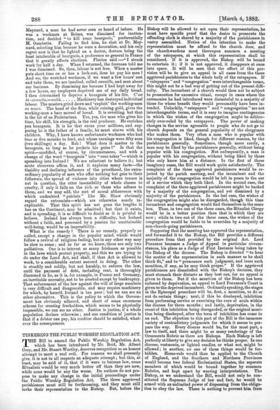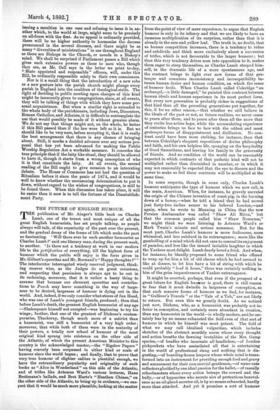TINKERING THE PUBLIC WORSHIP REGULATION ACT.
THE Bill to amend the Public Worship Regulation Act, which has been introduced by Mr. Reid, Mr. Albert Grey, and Mr. Stuart-Wortley, deserves recognition as an honest attempt to meet a real evil. For reasons we shall presently give, it is not in all respects an adequate attempt ; but this, at least, may be said of it, that if it were to become law, some Ritualists would be very much better off than they are now, while none would be any the worse. Its authors do not pro- pose to make any change in the initial proceedings under the Public Worship Regulation Act. The three aggrieved parishioners must still be forthcoming, and they must still make their representation to the Bishop. But, before the Bishop will be allowed to act upon their representation, he must have specific proof that the desire to prosecute the
offending clerk is shared by a majority of the parishioners in vestry assembled. Notice of the intention to make the representation must be affixed to the church door, and the churchwardens must thereupon summon a meeting of the ratepayers, at which this representation shall be considered. If it is approved, the Bishop will be bound to entertain it ; if it is not approved, it disappears at once into space. It will be seen that the effect of this pro- vision will be to give an appeal in all cases from the three aggrieved parishioners to the whole body of the ratepayers. If " ratepayers " and " congregation " were interchangeable terms, this might not be a bad way of getting out of the present diffi- culty. The incumbent of a church would then not be subject to prosecution for excessive ritual, except in cases where the ceremonies he had introduced were distasteful to a majority of those for whose benefit they would presumably have been in- tended. Unluckily, " ratepayers " and congregation " are not interchangeable terms, and it is easy to imagine contingencies in which the wishes of the congregation might be deliber- ately over-ruled by the ratepayers. The power of making changes in the service agreeable to people who do not go to church depends on the general popularity of the clergyman who makes them. Very often a man who is popular with his congregation is liked, though for different reasons, by the parishioners generally. Sometimes, though more rarely, a man may be liked by the parishioners generally, without being popular with his congregation. Not unfrequently, a man is popular with his congregation, without being liked by those who only know him at a distance. In the first of these imaginary cases, the Bill would work quite satisfactorily. The complaint of the three aggrieved parishioners would be re- jected by the parish meeting, and the incumbent and the majority of the congregation would be left in peace to the use of a service which they both liked. In the second case, the complaint of the three aggrieved parishioners might be backed by a majority of the congregation, and yet dismissed by a majority of the parishioners. In the last case, the wishes of the congregation might also be disregarded, though this time incumbent and congregation would find themselves in the same box. Thus, in two out of the three cases, the Ritualist Clergy would be in a better position than that in which they are now ; while in two out of the three cases, the wishes of the congregation would be liable to be overriden by a majority of non-church-going parishioners.
Supposing that the meeting has approved the representation, and forwarded it to the Bishop, the Bill provides a different procedure from that provided by the original Act. Lord Penzance becomes a Judge of Appeal in particular circum- stances, his place as a Judge of First Instance being taken by the Bishop of the diocese. The Bishop is directed " to hear the matter of the representation in such manner as he shall think fit," and to " pronounce such judgment, and issue such monition, if any, as he may think proper." If the aggrieved parishioners are dissatisfied with the Bishop's decision, they must stomach their distaste as they best can, for no appeal is given to them. But if the monition of the Bishop has been enforced by deprivation, an appeal to Lord Penzance's Court is given to the deprived incumbent. Ordinarily speaking, the stages in the Episcopal procedure will be, first, a monition, to do or not do certain things ; next, if this be disobeyed, inhibition from performing service or exercising the cure of souls within the diocese for three months ; and lastly, deprivation, in the event of this inhibition being disregarded, or the original moni- tion being disobeyed, after the term of inhibition has come to an end. The objection to this part of the Bill is the immense variety of contradictory judgments for which it seems to pre- pare the way. Every diocese would be, for the most part, a law to itself, and there might be as many renderings of the Ornaments Rubric as there are Bishops. Each Bishop is left perfectly at liberty to give any decision he thinks proper. In one diocese, vestments, or lighted candles, or what not, might be allowed ; in another, no one of these things would be for- bidden. Home-rule would thus be applied to the Church of England, and the Southern and Northern Provinces would become two federal Ecclesiastical States, the separate members of which would be bound together by common Rubrics, and kept apart by warring interpretations. The Bishop, as we understand the Bill, would not only be con- stituted the Supreme Judge of law and fact, he would be armed with an unlimited power of dispensing from the obliga- tion to obey the law. There is nothing to prevent him from issuing a monition in one case and refusing to issue it in an- other which, to the world at large, might seem to be precisely on all-fours with the first. As no appeal is ordinarily provided, there will be no higher authority to harmonise the decrees pronounced in the several dioceses, and there might be as many " diversities of ministrations " in use throughout England as there are Bishops in the Church, or moods in a Bishop's mind. We shall be surprised if Parliament passes a Bill which gives such extensive powers as these to men who, though they are, as Mr. Gell says in the letter we print to-day, " State appointed and responsible" officers, will, under this Bill, be ordinarily responsible solely to their own consciences.
Nor is it a small thing that the introduction of a new robe or a new gesture into the parish church might plunge every parish in England into the cauldron of theological strife. The right of deciding in public meeting upon changes of this kind might be innocently given to congregations, since, at all events, they will be talking of things with which they have some per- sonal acquaintance. But when a similar right is extended to the whole body of the parishioners, including Jews, Dissenters, Roman Catholics, and Atheists, it is difficult to contemplate the use that would possibly be made of it without genuine alarm. We do not say that things might not, on the whole, be better if this Bill passed than if the law were left as it is. But we should like to be very sure, before accepting it, that it is really the best arrangement that there is any chance of bringing about. Still, it marks a decided advance over any serious pro- posal that has yet been advanced for making the Public Worship Regulation Act a workable measure. It concedes the true principle that if the laity like ritual, they should be allowed to have it, though it starts from a wrong conception of who
it is that constitute the laity. At all events, the second reading of the Bill ought to give occasion to an interesting debate. The House of Commons has not had the question of Ritualism before it since the panic of 1874, and it would be well to know whether the unreasoning determination to put it down, without regard to the wishes of congregations, is still to be found there. When this discussion has taken place, it will be easier than it now is to tell the fortune of the Disestablish- ment Party.



































 Previous page
Previous page